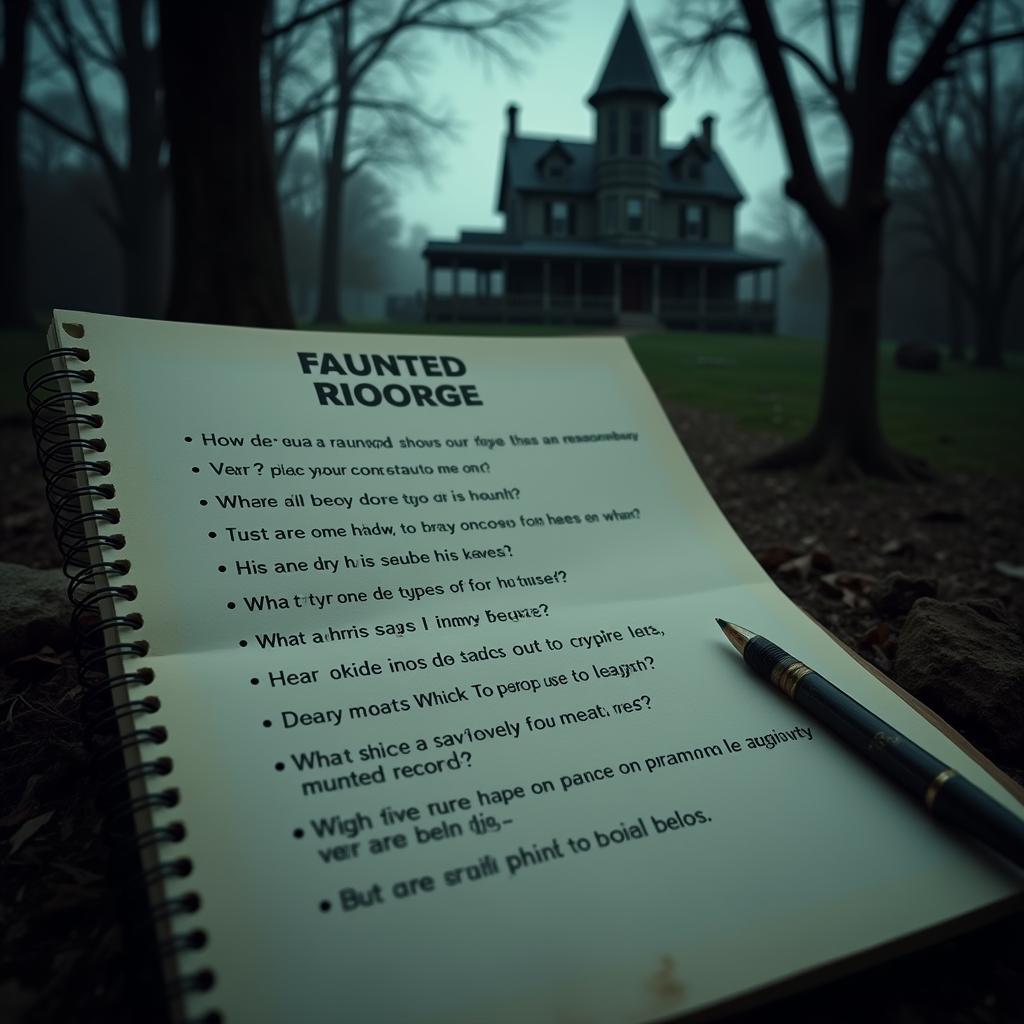Research is the backbone of any credible investigation, especially in the realm of the paranormal. Whether you’re exploring haunted houses or delving into ancient mysteries, a well-defined Research Plan Format is crucial. A robust plan ensures thoroughness, accuracy, and ultimately, impactful results.
A well-structured research plan format is like a roadmap to your investigation. It helps you to define your objectives, methods, and expected outcomes. Understanding the components of a good research plan allows you to collect and analyze data effectively, leading to more compelling and insightful conclusions. Similar to how we prepare for an investigation at a potentially haunted site, we must meticulously organize our research process. This systematic approach ensures we cover every angle and don’t miss any crucial evidence. Just as a poorly executed investigation can lead to misleading conclusions, a flawed research plan can derail your entire project. Having a clear understanding of the research plan format is essential for success in any field, particularly within the ambiguous world of paranormal research. Shortly after starting your research, you should find a research project sample to base your initial framework on.
Defining Your Paranormal Research Objectives
What are you hoping to achieve with your research? Are you trying to prove or disprove a specific theory about a haunted location? Or perhaps you’re seeking to understand the history and folklore surrounding a particular phenomenon? Clearly defining your research objectives is the first step in creating a solid research plan format. Think of your research objectives as the compass guiding your investigation. Without them, you risk wandering aimlessly and losing sight of your original purpose.
Formulating Research Questions
Once you’ve established your overall objectives, break them down into specific research questions. These questions should be clear, concise, and measurable. For example, if you’re investigating a haunted house, your research questions might include:
- What are the reported paranormal experiences at this location?
- Are there any historical records that could explain these experiences?
- What types of paranormal activity are most commonly reported?
 Defining Research Questions in Paranormal Investigations
Defining Research Questions in Paranormal Investigations
Choosing Your Research Methods
Your research methods will depend on the nature of your investigation. You might use historical research, interviews, or scientific instruments to gather data. A research proposal timeline format is essential for keeping your project on track. If you’re exploring the history of a haunted location, you might consult historical documents, local archives, and newspaper articles. If you’re investigating a reported haunting, you might conduct interviews with witnesses and use recording equipment to capture any unusual activity.
Combining Methods for a Comprehensive Approach
Often, the most effective research plans utilize a combination of methods. For example, you could combine historical research with on-site investigations to create a more complete picture of a haunting. This multifaceted approach provides a more robust and credible foundation for your findings. You can discover the highest paying research jobs in the paranormal field by combining multiple skillsets.
 Combining Research Methods in Paranormal Investigations
Combining Research Methods in Paranormal Investigations
Data Analysis and Interpretation
After you’ve collected your data, the next step is to analyze it. Look for patterns, connections, and anomalies. How does your data relate to your research questions and overall objectives? It’s important to interpret the data objectively, avoiding bias and preconceived notions. In paranormal research, this can be particularly challenging, as the subject matter is often open to interpretation. Referencing 03.06 research and citations is crucial for ensuring academic integrity in your paranormal research.
Presenting Your Findings
How you present your findings will depend on your audience and the purpose of your research. You might write a report, give a presentation, or create a documentary. Regardless of the format, it’s crucial to present your findings clearly, concisely, and accurately. Ensure you document your sources and methodology meticulously, as transparency is essential for credibility in paranormal research. Remember, your research is only as strong as its presentation.
 Presenting Paranormal Research Findings Effectively
Presenting Paranormal Research Findings Effectively
Conclusion
A well-defined research plan format is the foundation of any successful paranormal investigation. By carefully planning your research, you’ll be well-equipped to explore the mysteries of the unknown and shed light on the unexplained. Remember to clearly define your objectives, choose appropriate research methods, analyze your data thoroughly, and present your findings effectively. With a solid research plan format, you can delve into the dusk settles special research and uncover compelling insights into the world of the paranormal.
FAQ
- What is the purpose of a research plan format?
- What are the key components of a research plan format?
- How do I choose the right research methods for my investigation?
- What are some common mistakes to avoid when creating a research plan format?
- How can I ensure the objectivity of my research findings?
- What are some effective ways to present Paranormal Research findings?
- How do I incorporate ethical considerations into my research plan?
For further assistance, please contact us: Phone: 0904826292, Email: research@gmail.com or visit us at No. 31, Alley 142/7, P. Phú Viên, Bồ Đề, Long Biên, Hà Nội, Việt Nam. We have a 24/7 customer support team. You may also find further information within articles such as Research Proposal Timeline Format or Highest Paying Research Jobs.